Dancing In The Dark
version 1.0 – the experiment
1982
Win Patrick : guitar, vocals
J. Free : vocals, guitar
Cris Patrick: drums
Eric Weitzel: drums
Cubby Henderson: conga
Bitsy Byron: additional vocals
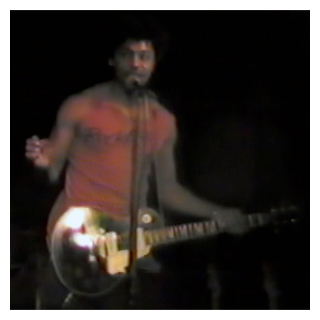
version 1.0 – the experiment
1982
Win Patrick : guitar, vocals
J. Free : vocals, guitar
Cris Patrick: drums
Eric Weitzel: drums
Cubby Henderson: conga
Bitsy Byron: additional vocals
It’s crazy – you write a little chapter of history, and then one day you discover something in a box that changes everything. In this case, a tape containing two live performances by an early version of Dancing In The Dark, which suggested that this band was really on to something.
I have no photos of the early line-up, and the only notes provided on the tape are song titles and a couples of dates, from shows we played at the Seventh Street Entry. I don’t remember a lot of the details of how it got started, but I’d be willing to bet it was Win’s idea. I was game as long as I could play whatever I wanted on guitar – even if it exceeded my ability at the time. All I knew was that I didn’t want to play conventional rock guitar cliches, and these tapes suggest I was successful in that respect.
I think the set from August 28th was our first show ever. We had a few basic musical themes and partially written songs, but most of what we did was improvised on stage that night. That might be the most apparent during tracks 4 and 5. Win’s brother Cris was on loan that night from his “hardcore” band Todlachen (which also featured a 16-year old pre-AmRep Tom Hazelmyer). The Suprees were the headlining act on this night, featuring former Things That Fall Down bassist Garrison White [RIP], who can be heard laughing at the end of our mangled interpretation of the TTFD “Theme”. It was great to hear Cubby playing conga on this recording. He was an old pal of Win’s, and we shared a love of the music of Roland Kirk. He kept all of his Kirk LPs in a milk crate, and declared that if his apartment ever caught on fire and he could only grab one thing, it would be that crate of Kirk albums. Cubby told me that Kirk claimed “jazz” was a white man’s term for the music he played. I don’t think Cubby knew what to make of the music Win and I played, but he definitely added a lot of energy to that set.
Dancing In The Dark
7th St Entry 28 Aug 1982
I have even less information about the set from September 18th, although I suspect that Eric was still on bass, and Jim Meyer may have been on drums at this point. My guitar histrionics had toned down a bit, and I was attempting more “structured” parts, although they still weren’t very conventional. “Modern Cowboy” and “Friends” were both updated versions of songs I originally wrote for The Sacred Version, and “Music To Spy By” was a song Win co-wrote with two of my old bandmates from that group, under the nom de plume The Burkes (although allegedly, that band never actually existed).
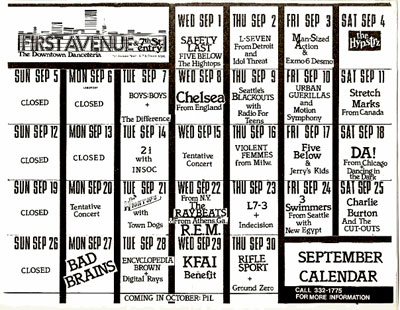
Dancing In The Dark
7th St. Entry 18 Sep 1982
This established a new strategy for the band, as Win and I began combining our individual songs together. The result was slightly longer songs with interesting chord pattern changes, and occasional recurring themes. It worked pretty well, although it really wasn’t that thought out at the time – it was just something we did to keep the groove of the songs moving along. “Stay Ahead” started out as a guitar theme I had been recycling for a while, in my attempt to play something in the same vein as The Contortions. Win provided the original lyrics and the name of the song, and my initial lyrics were re-worked from another old song performed in The Sacred Version, called “Cut It Out”. Those lyrics were eventually combined with the one and only rap lyric I ever wrote, which I had intended to use as an official “theme” for the band, while commenting on the local music scene at that time. The more or less “definitive” version would be featured on the cassette release from the subsequent version of Dancing In The Dark – version 2.0.
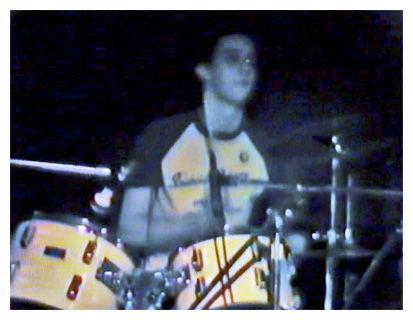
version 2.0 – the power trio
1982
J. Free: vocals, guitar
Win Patrick: guitar, vocals
Jim Meyer: drums
Listening to this energetic little combo really helps put things in perspective. Old friends were around, and being in a band was a fun way to burn off energy, in the midst of the politically-charged climate of Reaganomics. Playing in this band helped me get over a divorce, and it brought pals together that didn’t even understand what we were doing. Who knows what it will do to you!
The three of us worked together at a local eatery, which was a hotbed of activity in the Minneapolis music scene – back in those days, the real Minneapolis music scene could be found in the kitchens of just about any restaurant you cared to name. Wendell “Win” Patrick was as much a catalyst for this band as I was. All I did was write words and scratch my way out of whatever riffs I had gotten myself trapped in. The name of the group came from the title of an instrumental from my previous combo, The Hytones. It should be noted of course that this was is no way related to the Kim Carnes song of the same name, which wasn’t released until 1983. The same goes for Bruce Springsteen, who didn’t release his song of that title until 1984. The irony in that last tidbit of information was that Win was just about the biggest Springsteen fan you could hope to find. Maybe “The Boss” was giving something back.
Win had the rock’n’roll enthusiasm that made this work – more than once, in fact. Typical for the times, this outfit had already called it a day, when Win called me up and said he had booked us a gig at a local club, Duffy’s (long gone, but not forgotten). Jim Meyer was already honing the skills that would take him through his future career as a music writer and editor, and I had already published a couple of free-lance pieces of my own, while also running sound for a local band, which would lead to my involvement with Borrowed Time.
I don’t recall if our cassette release was recorded before or after that show, but I’m pretty sure it was our last show with that line-up. We practiced in the basement of Jim’s grandmother’s house, and one day decided to record our songs – all eight of them – on a boombox. With a little clean-up, plus the addition of a live track (a re-worked cover of the Things That Fall Down theme performed by an early incarnation of this band), those songs became our cassette album release.
This was definitely a “low-fi” release, years before the term became popular. I think only a hundred or so were ever made, and they sold in shops for a couple bucks. I heard that one of the members of Man-Sized Action got one of our store displays, and everyone in that band had a copy of our tape – thanks, fellas!! I included an intro at the beginning of the tape from the first time we were played on KBEM-FM; the radio announcer is Mike McClellan. Hey, we were getting airplay on the radio! I always thought that was kind of funny, but in those days it wasn’t really that hard to just walk into a radio station, and hand the DJ something to play. The standards weren’t too stringent at the time. KBEM is a jazz station these days, so I rather doubt it would be that easy to get something like this on the air again, but we enjoyed our fifteen minutes of local fame while it lasted.
There’s not much else to to tell about this version of the band; we came, we went, we conquered our own inhibitions. The songwriting credits alone carried the torch for some of the movers and shakers of the early ’80s Mpls underground music scene: Karen Masantz [Rifle Sport], Shawn Pike and Tim Mitchell [The Sacred Version, Bwana Devil, Timbuktu, Fingerhead], and of course Things That Fall Down. There were several different versions of this band, and a few tracks from each incarnation appear elsewhere on this site. Although many of us lost track of one another over the years, history has a way of catching up with you – during 1998-1999, I was writing short reviews and blurbs for Request magazine, whose Senior Editor was none other than Jim Meyer.
Sadly, there is an unhappy footnote to the story. Win had been living in San Francisco, working as an art designer for Virgin Records. In early 2003, he moved back to Minnesota, and surprised me by showing up at a show I was playing at The Fine Line (with Panel Of Experts, as part of a Clash tribute). He told me about a film he was working on, and we discussed some new musical ideas for the project, as well as dusting off the old Dancing In The Dark recordings for a CD release. The last time I saw Win was in early spring of that same year, when I loaded him up with tunes for his motorcycle ride back to California.
In August 2003, I returned from a camping trip and learned that Win had returned to Minnesota shortly after his departure, and had passed away under dubious circumstances following a motorcycle mishap. I heard that a couple hundred old friends who hadn’t seen each other in almost twenty years, turned out to pay their respects at his funeral. Win’s mother was sweet enough to send me a copy of the program, which was written by his brother Sean. I never got the chance to share some of these memories with her, before she too passed on in 2005. As I never got to give Win a proper farewell, I’m doing it here, by way of a tribute to the project he helped create. I hope the effort does the memory justice. If he’s checking these clips out right now, he’s probably laughing his ass off. Maybe you will too.
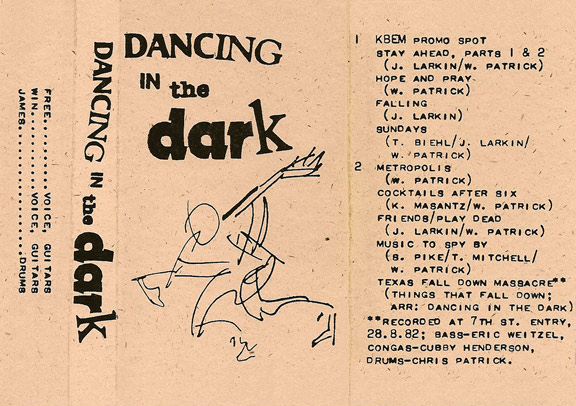
Dancing In The Dark
1982 cassette album
Stay Ahead (original version & remix), Falling, Friends – words & music: J. Free; © 1982; 2006
Hope And Pray, Metropolis, Play Dead © Wendell Patrick; 1982
Falling, Friends– words & music: J. Free; © 1982
Sundays – words: Toby Biehl; music: J. Free & Win Patrick; © 1982
Cocktails After Six © Karen Masantz / Wendell Patrick; 1982
Music To Spy By © Shawn Pike / Tim Mitchell / Wendell Patrick; 1982
Texas Fall Down Massacre is not included in this tracklist;
but is included in its’ original context as performed by Dancing In The Dark v.1.0
In the radio spot, “Mick” is credited as playing guitar.
That was in reference to Micki Ellis, who was a member of The Hytones earlier that year, but wasn’t officially a member of this line-up.
Micki would however, become a major participant in Dancing In The Dark v.3.0
Recorded and mastered (as such) by J.Free;
digitally re-mastered and transferred to CD-R in 2003.
These versions were re-mastered from the CD-R in 2009, as further attempts to generate another transfer from the original cassette master were unsuccessful.
Drawing on cassette sleeve by Nick Leonard.
View/download highlights from the Live at Duffy’s VIDEO
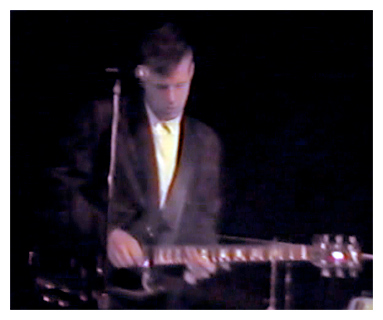
version 3 + 1/2
1982
J. Free: vocals, guitar
Irving Safari: violin
Micki Ellis: rhythm guitar, vocals
Roland: beat
I’ll blame this one on my old pal Nick Leonard – the same fellow who unwittingly nudged The Sacred Version into existence, by way of a few innocent introductions. Well, in this case, it happened again – twice. Enter one Irving Safari (nee Dan Krislov) on violin; whose “regular” politico rock’n roll combo – The People’s Joy Boy Squad – quickly became a local favorite of mine. Micki Ellis was another friend of Nick’s, and he held down the bottom end with his rock-steady rhythmic acoustic beat.
We rehearsed in the tiny one-bedroom apartment I shared with my future bandmate Melne, and on occasion, it seems a few of the adjacent neighbors weren’t exactly delighted by our sound. But we did play out once or twice, and I may actually still have a cassette of our gig at Smik Smak Theatre, sharing a bill with the 2-person Borrowed Time, and The People’s Joy Boy Squad – possibly even a bill with 2i. It’s great if all your friends are in bands with each other, yes?

version 4th + Final (Big Band)
1982
J. Free: vocals, guitar
Melne: guitar
Irving Safari: violin
Win: bass 1
Mark: bass 2
Micki Ellis: rhythm guitar, vocals
Kimuel Hailey: beat
Okay, I’ll admit to being a bit fuzzy on this one, as it was a very short-lived line-up, and we never actually played out.
If memory serves, the impetus for assembling this bunch may have been some sort of benefit gig, which it doesn’t seem that we actually attended. Or, maybe not. Quite possibly, we just all thought we should be in a band together. Maybe I’ll dig up something will bring it all back, but I’ve got at least one recorded session, albeit somewhat lo-fi as it were.
Since Dan and Micki were on board for this, I’m thinking that they kind of started it. Also, we rehearsed in the basement of a house in the well-to-do Kenwood neighborhood, where Dan’s friend Mark lived. I do recall that as an aside, Mark introduced me to the music of The Pop Group, for which I am eternally grateful. Kimuel, of course, had been a part of The Hytones, with both Micki and myself, and Melne and I had both been in Borrowed Time. It seems that Win was on board for a minute, but again, I’m a bit fuzzy as to the details. In other words, a super-group of sorts (in my own mind, anyway), even if we barely existed.